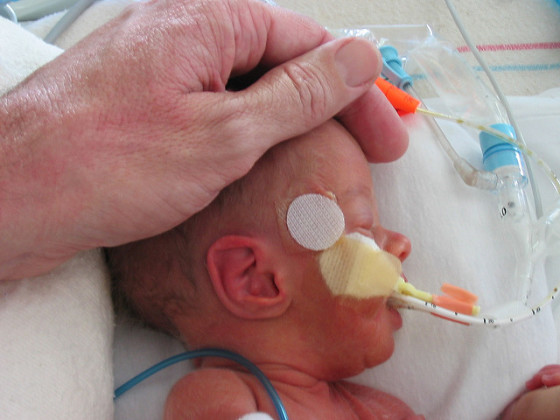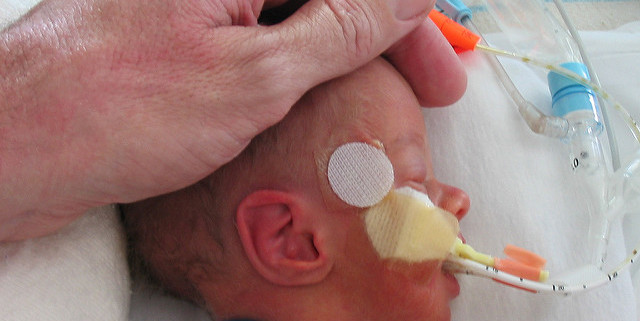Premature Birth: What Does It Mean for Your Baby?

Over the course of about 9 months, a baby develops from a tiny clump of cells into a fully-functioning tiny human that can survive outside the womb. By the end of your pregnancy, the baby’s lungs can breathe without help —that’s usually the last major function to develop fully — and your new arrival is ready to be born. However, some babies are a little bit eager to get out into the world and are born early. What does a premature birth mean for your little one?
Contents
When Is A Baby Premature?
We tend to think of pregnancy as lasting about 9 months. Doctors talk about it in terms of 40 weeks. However, it’s not really such an exact science. In part, that’s because everyone is a little bit different and some women will have longer or shorter pregnancies than others. It’s also because we often can’t pin down the exact date of conception, so we end up with just a ballpark estimate of how long the pregnancy has lasted so far. In any case, 40 weeks is the rule of thumb.
A “premature birth” generally refers to delivery before 37 weeks — so about 3 weeks early. By the end of your pregnancy, you’ll be very much ready to deliver. However, we want the baby to stay in the womb for long enough to allow full development of the lungs and other major systems. Babies born prematurely (often referred to as “preemies”) may not be equipped to survive in the world outside the womb.
Premature Baby Development Timeline
The majority of premature births happen in the “late-preterm” period, which falls between 34 and 36 weeks. In many cases, those babies may not actually be premature at all. Instead, it may be an issue of an incorrect estimate of the time of conception. Babies born in the late preterm period rarely have any health problems; they’re usually fully developed even if they are a little early.
Babies born before 34 weeks, however, can have more serious health problems. These are broken into 3 segments:
- Moderately Preterm: 32-34 weeks
- Very Preterm: earlier than 32 weeks
- Extremely Preterm: earlier than 25 weeks
Preemies Survival Rate, Challenges
The earlier the baby is born, the higher the risk of serious health problems. Babies born extremely preterm may not be developed enough to survive outside the womb.
The likelihood of survival for babies increases with every week closer to full term:
- 22 weeks or fewer: 2-15% survival rate, mostly anecdotal
- 23-24 weeks: 15-40% survival rate
- 25 weeks: 55-75% survival rate
- 26-28 weeks: 75-85% survival rate
- 29-32 weeks: 90-95% survival rate
- 33-36 weeks: >95% survival rate
While the survival rate for preemies born after about 26 weeks is fairly high, many of those children are at risk for serious lifelong health problems. Premature birth increases your little one’s risk of cerebral palsy, severe intellectual impairment, and severe physical impairment, as well as milder forms of impairment.
In general, babies born prematurely are at a higher risk for:
- Breathing problems: Your little one’s lungs finish developing fairly late in your pregnancy. Your little one’s lungs might not be fully functional until you hit term. Preemies are at risk for apnea, respiratory distress syndrome, and bronchopulmonary dysplasia. Apnea causes the baby to stop breathing for up to 20 seconds at a time, while respiratory distress syndrome is caused by a shortage of certain proteins in the lungs and can cause portions of the lungs to collapse. Bronchopulmonary dysplasia can cause fluid buildup, scarring, and permanent damage to the lungs.
- Heart problems: The baby’s heart, like the lungs, may not be fully developed. Preemies are at a higher risk for patent ductus arteriosis, a defect in the connection between the major blood vessels near the heart that can cause heart failure. Preemies also are more likely to suffer from anemia, which is a shortage of red blood cells.
- Brain damage: Preemies are fragile and the delivery process can result in trauma to the brain or oxygen deprivation. They’re also at risk for intraventricular hemorrhage, or bleeding in the brain.
- Other health problems: Depending on how premature your little one is, there are a number of other health problems that can happen, including damage to the intestines and liver. Preemies are at a higher risk of serious infection, too.
Preterm Baby Care
Preemie babies also look somewhat different from full-term babies. They may be very tiny — sometimes just a couple of pounds. Their heads will be proportionately larger and their skin will be thinner and more translucent. They’ll be very weak and may be unable to curl up into the fetal position on their own. They’re fragile and can bruise easily. Extremely preterm babies may not even be able to cry.
Babies born early may need to spend some time in the newborn intensive care unit (NICU) to grow and develop before you can take them home. Babies with severe breathing problems may need help from a respirator in order to breathe and may need antibiotics and other medications to combat infections and imbalances.
See also: Birth Injury vs. Birth Defect: Why It Matters
How Can I Avoid Premature Birth?
Unfortunately, no one really knows what causes premature birth. However, there are certain things you can do to lower your risks.
First, you should quit smoking and drinking alcohol, both of which increase the risk of premature delivery. Next, you should seek out prenatal care as soon as you know you’re pregnant or if you notice any signs of labor earlier than expected. Getting good prenatal care will improve the overall health of your pregnancy, as will eating the right foods and getting a healthy amount of exercise.
If you’re pregnant and believe you’re going into labor early, you should seek immediate medical attention. Your doctor may be able to administer antenatal corticosteroids or tocolytics, drugs that can slow or stop your contractions and hopefully delay the pregnancy. There are, unfortunately, no guarantees, but at least you’ll be in a hospital where your doctor can provide the best possible care for your little one.
Work with your baby’s doctors to ensure that you understand your little one’s condition and the care that is being administered. Your little one may be connected to IVs and medical machines, which is scary to see, but those machines are designed to protect your baby and allow healthy development.
If you do have a premature birth, it can be stressful and upsetting to cope with your new baby’s health problems. Don’t be afraid to reach out to your family and friends for support in a difficult time.
Image Credit and License








Leave a Reply
Want to join the discussion?Feel free to contribute!